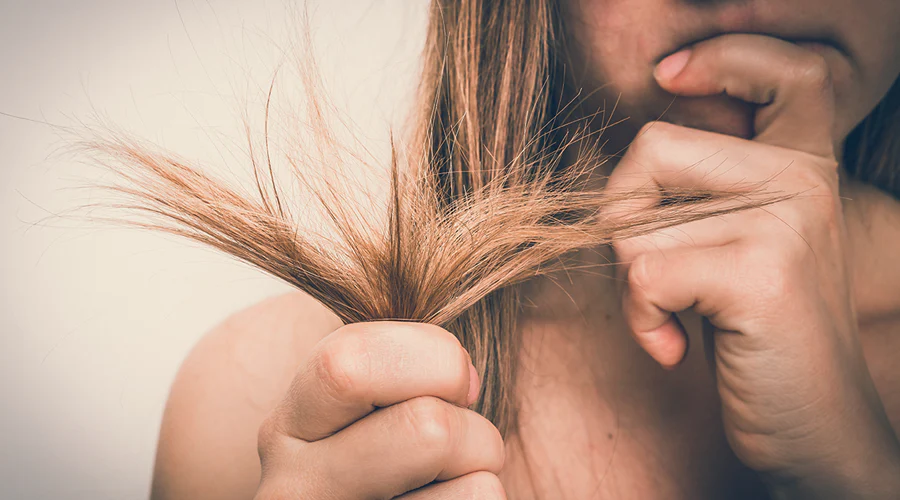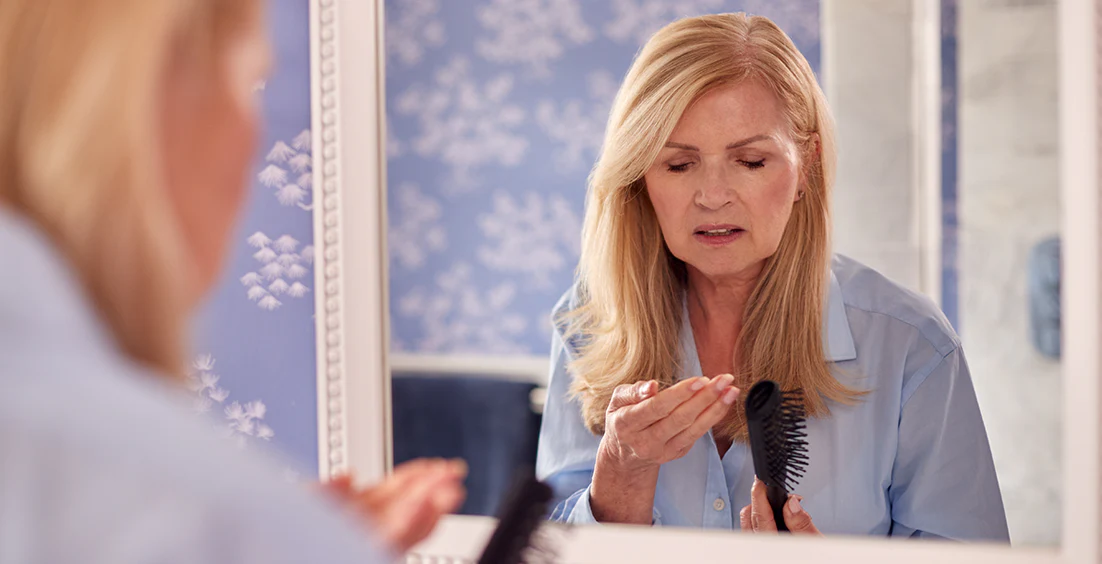Menopause is an age-related stage and a natural part of aging in a woman which is marked by the end of the menstrual cycle. In the initial stages, women may begin to experience a wide range of side effects ranging from hot flashes, irregular menstrual flow, and night sweats to mood swings.
However, these are not the only changes. An article by Johns Hopkins’ Medicine on Women’s Health has also listed hair loss as one of the effects of menopause. According to the article, fluctuation of hormones in women during menopause can lead to hair thinning on the scalp.
Now, you are probably asking, how exactly does menopause change your hair? Women start losing their hair during menopause because of changes in hormone levels, especially estrogen which happens as a result of aging. Oestrogen is a hormone regarded as hair-friendly because it is responsible for keeping hair in its growth phase for a long.
Understanding Menopause Hair Changes
As mentioned earlier, estrogen is a hormone responsible for hair growth and reduces as we age, the reason why women in their menopause stage experience hair loss among other side effects.
According to health experts, once the body is not able to produce enough estrogen, the hair begins to break easily because the hair being produced by the follicles begins to thin and become naturally fragile. Since the hair follicles of women are more sensitive to dihydrotestosterone (DHT), their hair loss and thinning become more noticeable during menopause.
A drop in estrogen levels during or around menopause can lead to an increase in the body’s testosterone levels. In most cases, this hormone negatively impacts the hair follicles once it becomes dominant thus leading to what experts refer to as menopause hair loss.
Target menopausal hair loss with Menocil and regain your confidence
What Happens to Your Hair During Menopause?
During menopause, many changes take place not just in the body but also skin and hair. During this phase, the level of estrogen reduces, leading to hair volume loss and a reduction in sebum production.
Sebum is naturally produced in the scalp and is responsible for lubricating the scalp. So, reduction in sebum will obviously lead to flaky scalp and dry skin which in turn leads to less sebum infusion into the hair.
As a result, the hair becomes drier, more brittle, duller, and susceptible to breakage hence necessitating you to explore options such as menopause hair loss treatments or menopause hair loss supplements to manage the changes.
Common Hair Issues Women Face During Menopause
As already mentioned, estrogen is a crucial hormone as far as hair growth is concerned. It is a hydrating hormone and it impacts the hair in many ways, from hair growth to sebum production.
Sebum is a natural oil found on the scalp responsible for keeping the scalp and hair hydrated. That’s why when there is fluctuation or reduction in estrogen levels, the changes in the hair become noticeable. Some common changes related to menopause include:
- Hair loss
- Dull and dry hair
- Hair thinning or loss of hair volume
- Brittle and weak hair strands which are more prone to breakage
- Scalp that is dry and sensitive
- Change in hair texture
According to the co-founder of Womaness, a menopause wellness brand, Sally Mueller, a lot of women begin to witness perimenopause hair changes during the menopause phase due to a drop in estrogen levels. The changes are usually characterized by hair loss, dry hair, and hair thinning, forcing most women to move from straight to curly hair.
Why Does Hair Thin During Menopause?
 Does Menopause Change Your Hair
Does Menopause Change Your HairIn one review, hormone changes, especially estrogen have been associated with hair cycle, growth, and density. Estrogen is said to play a crucial role in hair follicle structure and hair cycle. During menopause, this hormone level in the body usually declines leading to hair disorders like menopausal hair loss and hair thinning.
In another study, estrogen reduction has been shown to be the cause of hair loss during menopause. A decline in estrogen levels during menopause reduces the supply of blood to the hair follicles due to constriction of blood vessels in the scalp. Reduced blood circulation later leads to hair thinning and hair loss because there is a restriction of oxygen and nutrient flow.
Practical Tips to Combat Hair Thinning
Menopause hair loss is one of the symptoms you are likely to experience during the menopause period. To address hair thinning experts, recommend menopause hair loss treatment like hormone replacement therapy (HRT).
HRT according to experts is one of the best approaches to dealing with hair thinning because it aids aid helping with estrogen restoration during the pre-menopause phase. The treatment may help in relieving a wide range of menopausal symptoms including mood swings, hot flashes, decreased libido, osteoporosis, and hair thinning.
Should you opt for HRT, we recommend sharing your decision with your doctor first before the treatment. This is important because it gives clear guidance on the best therapy to settle for.
Remember, not all hair therapies are hair-friendly. While some may be beneficial others can aggravate hair thinning. Your doctor should work with a Trichologist to find the best HRT treatment for your hair thinning problem.
The best menopausal hair thinning treatment is one that addresses hormonal sensitivity present in your hair follicles which involves a mixture of the following:
- Stress management (stress has been linked to increase in androgen levels)
- Hair follicle stimulants like methyl nicotinate and minoxidil
- Scalp drops packed with hormones
Enhancing Hair Care During Menopause
There is no approach that can fit all menopause hair loss-related effects because the effects for individuals vary. However, based on which hair changes you are going through as a result of menopause, you can adapt any of the following haircare routines to help you meet your hair care needs:
Ensure you max out your hair moisture.
Maintaining hair hydration is vital especially if you are experiencing hair dryness. Try changing your hair formulas to more hydrating ones.
Alternatively, you can add deep conditioning treatment to your current formulas to ensure that you maintain healthy moisture levels and let the hair strands keep shining.
Also, changing your shampoo schedule can be an alternative to addressing hair dryness and reducing menopausal hair loss. Washing your hair too often dries your hair further, making it more prone to breakage. Not washing your hair every day gives it more body and makes the hair look much better.
Get to know the texture of your hair.
Does menopause change your hair texture? Yes, it does, and should your hair strands’ texture change, it will be necessary that you learn about how to handle your new hair type and its needs.
Using products that align with your texture and type not only simplifies your haircare routine but also keeps it healthy. For instance, if you have frizz-prone hair strands, using smoothing products will be ideal.
Stepping up your scalping routine
To improve menopause hair growth, it is important that you keep your scalp healthy. Ensuring that it is clean and moisturized gives support to your hair follicles.
Besides normal shampooing and using sun protection, you also need to incorporate a healthy scalp care routine like scrubbing to remove build-up or applying serum to stimulate hair growth. This will go a long way in hydrating the hair and promoting its volume and strength.
Eating Healthy to manage menopausal-related hair changes
Embracing a nutrient-rich diet can go a long way in improving your hair health during the menopause phase.
Eating food with the right hair-enhancing vitamins like oysters, eggs, nuts, sweet potatoes, chickpeas, and spinach can help improve the condition of your hair during menopause.
Keeping Off Hair-Damaging Styles to Reduce Menopausal Hair Changes
To reduce the risks of menopause hair loss and hair drying during menopause, it is important to reduce certain hair styling that is likely to damage the hair like blow drying, curling, straightening, coloring, and perming.
Refraining from tight ponytails can also be a good hair practice during this period as it prevents permanent hair loss throughout the crown and hairline.
Embracing New Hair Cut
Starting afresh with a new haircut can help transform hair growth and density by allowing it to grow thicker and faster. It may also prevent further hair breakage during and past menopause.
Feel the difference in your menopause experience with Menocil
Advanced Hair Treatment Options
After you have tried the above tips to promote menopause hair growth and nothing seems to work, it may be time to seek advanced hair treatment options like the use of hair growth-enhancing supplements.
Incorporating the best hair menopause dietary supplements for preventing hair loss into your haircare routine can aid with hair and scalp health.
Supplements containing biotin, zinc, iron, vitamin D Omega 3 fatty acids, saw palmetto, and collagen are regarded as some of the best supplements for managing hair thinning and hair loss during menopause.
Zinc and iron supplements for hair loss are said to prevent hair shedding. Vitamin D supplements promote hair growth while collagen supplements enhance hair strength. Omega 3 fatty acid supplements on the other hand counteract hair thinning while biotin supplements prevent hair loss.
However, before committing to menopause hair loss supplements, ensure that they contain clinically proven ingredients with scientific backing.
Also, consulting with a functional doctor who understands how natural solutions work can help you choose the right options available on the market.
Comparative Analysis of Cogniultra Ingredients & Nootrogen Ingredients
Conclusion
Menopausal hair changes or premenopause hair changes like hair thinning and hair loss come with their own share of challenges. Fortunately, there are solutions that can adequately address these issues.
The use of products and lifestyle changes are some of the things you can incorporate into your haircare routine to mitigate the symptoms.
For those women experiencing menopausal hair loss, we recommend trying products tailored to address your menopausal hair care needs.
If you are considering exploring products to manage your menopausal hair health-related concerns, you may find the products here worthwhile.

